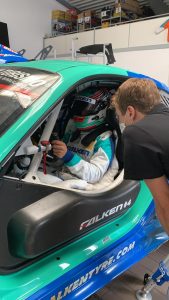Having an accident at 260km/h usually results in a big impact, particularly if it happens on the Nordschleife. Car damage is inevitable and the drivers usually experience substantial unwanted after-effects from the unforgiving Armco.
But at this year’s Nürburgring 24-Hours, Falken driver Peter Dumbreck’s high speed into the wall left him with no aches or pains the next morning. That was fortunate as he was just a day away from starting the 24-Hour race itself. The team might have had all-nighter fixing the Porsche 911 GT3 R but Dumbreck was fit and ready to race.
“I was coming down Fuchsröhre, a very fast section,” says Dumbreck, a veteran of 17 N24s and one of the most experienced drivers in the field. “Suddenly the 911 in front snapped sideways and it was the same for me. I was a passenger at 260km/h before it eventually hit the wall coming out of that section.” It was a big impact, the whole side of the car was regrettably damaged and, just ahead of the big event, it was not ideal timing.
“By next morning the team had done a fantastic job to get it ready for final qualifying and like the car, I was feeling brand new. I put a lot of this down to a new seat system we started using in the Falken team this year,” adds Dumbreck.
The seating system he used comes from German supplier Soft Trim, in the form of its Spacer, which is made from EPP (expanded polypropylene), a 3D-engineered material that delivers energy absorption with structural strength at a very low weight. FIA-approved and 100% recyclable, it also offers chemical resistance as well as thermal and acoustic insulation and can take multiple impacts. As it is isotropic, its energy performance is also independent of the direction of impact. A Perlon fabric cover makes the insert extremely flame-resistant too.
Trusted by Manthey-Racing, FFF Racing, Earl Bamber Motorsport and listed in the Porsche RSR manual as a recommended seat, 2020 saw Falken’s team opt for the Spacer system for the first time using a version specifically created for the 24-hour race.
 Soft Trim claims that the Spacer is designed specifically to reduce driver movement in the seat. Alongside the benefits of not having the driver shifting around during an impact, it improves the feeling between driver and car, giving better feedback.
Soft Trim claims that the Spacer is designed specifically to reduce driver movement in the seat. Alongside the benefits of not having the driver shifting around during an impact, it improves the feeling between driver and car, giving better feedback.
The process starts with a scan, with 3D scanning used to get the most accurate fit to the driver, according to Soft Trim commercial manager Kai Rudolph: “We spend time with the driver either at the racetrack or workshop to get an accurate scan that captures every contour. With this data, we then machine the EPP using our CNC machine. It is a fast process; from scan to finished insert takes around 1.5 weeks and is repeatable. Once we have the data we can just make more Spacer in a matter of days. That’s handy if you need spare or have damaged it.”
By scanning the drivers, engineers also have the chance to compare the individual seating positions of different drivers on screen and, by synchronizing the data, it enables Soft Trim to create common seat inserts. This was a benefit to the Falken team that had its driver line-ups disrupted by Porsche’s decision to withdraw its factory drivers just days before the event. Soft Trim’s interchangeable inserts and ability to make new ones made it much simpler for Klaus Bachler and Sven Mueller piloting both of the team’s cars to make up the shortfall of drivers.
“At Falken we have four drivers of different heights and weights and Soft Trim was able to make one insert to fit us all without need for a change at the pitstops,” adds Dumbreck. “It was one less thing to think about.”
Soft Trim also has created an air-cooling system thanks to a milled network of air channels and additional comfort pads that give additional support where drivers need it. “The seat was really comfortable and impressed me,” adds Dumbreck. “Ultimately, it worked well for the entire Falken team.”





